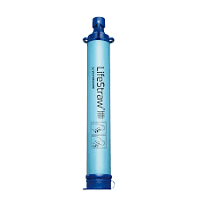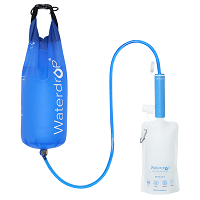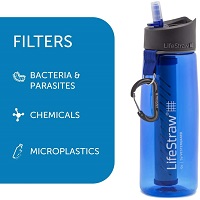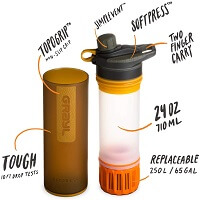Table of Contents [show]
As many of you may know, clean drinking water is kind of a big deal.
The fact that nowadays we can get drinkable water right from the comfort of our own home, practically for
free,is downright revolutionary.While portions of the globe enjoy this recent development, it still remains
almost entirely out of
reach for billions of people across the world.
You will never find a lighter or more portable water filter at the
moment than straw water filters.
This is where the Lifestraw came into play. Offering a small, lightweight, portable, durable, and relatively
inexpensive filtration device, Lifestraw provides filtered water
on the go. Simply hang it around your neck like a necklace, and worry less about the access to clean drinking
water. In fact, the Lifestraw has won an endless string of accolades,
quickly becoming known as “one of the ten things that will change the way we live”, with legions of adoring fans
singing its praises, and even swearing by its use in a variety of situations.
What’s the Lifestraw?
The Lifestraw offers a hollow-membrane filter built into a straw. Simply
place the straw into water, and drink. Sucking the water up through the straw forces
it through the filter, which removes up to 99.9999% of bacteria, and 99.9% of protozoa, down to 0.2 microns. The
integrated filter is said to last for up to 1,000 liters, at a price of $20.
Not bad, right?
Those are decent stats, however, the Lifestraw is incapable of removing
microscopic minerals, chemicals, or even viruses. This filtration method is certainly
better than nothing, and prevents most water-borne diseases, as opposed to preventing none. Ultimately, the
Lifestraw was designed to provide excellent filtration at a reasonable cost,
which is probably more effective than providing perfect filtration at a high cost. Expensive, perfect filtration
could very well be too expensive to accomplish the reduction of third
world diseases. Again, missing the viruses isn’t a deal-breaker, and it is still capable of preventing a large
number of water-borne diseases from infecting at-risk populations, but people
talk about this thing like it’s the Messiah of water filters.
The Weird Problem Lifestraw Reviews Fail to Mention
I have gone over this problem again and again in my head, looking at the
endless assortment of glowing Lifestraw reviews, “Invention of the Century” accolades,
and legions of ardent fans. Yet, I still cannot fathom why no one seems to notice or care this one small detail.
Simply take a look at this snazzy, in-action shot of a guy using his
Lifestraw out in the real world:
What happens when you walk away from the water?
No more water.
If you find yourself heading into riverless mountains, the desert, or a 12
hour bus ride in body-temperature heat, as well as any other situation in which you
won’t have access to water, you will most likely need to fill a water bottle ahead of time. Whenever you want a
drink of water, you’ll probably end up with wet clothes – sexy! People gush
over the simplicity of this process, as though handling three caps instead of one is somehow… more simple?
On a related note, imagine traveling with this thing, and trying to fill up
from a sink. You’d have to plug the sink, fill it up, wait for it to get deep enough
to drink, then take a few sips, unplug the sink, and walk away. Imagine being incredibly thirsty and trying to
do this in a hurry. Now imagine you’re about to get on a 12 hour bus ride
through midday temperature highs, and all you had ahead of time was a quick sip from the sink, and that’s all
you’ll have until the next time you get to another sink, when you’d begin
the sink plug process all over again – just for one sip.
Seriously, has anyone actually used this thing?
What the Lifestraw Should Have Been
So here we have finally arrived at a product that’s actually recommendable:
the Lifestraw Go. The makers of the Lifestraw took their product, and stuck it
inside a water bottle. Lifestraw thereby eliminated the pointless inconvenience of only being able to drink with
water nearby, or having to deal with three different caps, as well as
two separate objects for every sip.
The Lifestraw Go has claimed that, although Lifestraw’s lifespan estimates
are intended to be a little on the safe side, using low-quality water for all of its tests
were proven to come up short. While these estimates were reasonable, the difference in performance is likely to
be smaller than those which are claimed. And again, it’s not that it’s a bad product,
as the filtration quality will probably work just fine if you’re hiking in North America, and supplementing with
iodine tablets as needed. This is especially true for trips to Mexico, or wherever
else you might want the aid of anti-viral protection. If you’re drinking a liter of water per day, a $35
Lifestraw Go will more than likely last you 3 years, which isn’t bad at all. If you are
only using it for weekend camping trips, your Lifestraw Go will last much longer. Comparatively, I think it also
looks nicer than the Sawyer. So while it’s definitely good; it’s not necessarily
the best, neither in terms of filtration quality, or on cost-effectiveness.
This water filter straw kit from Waterdrop ticks all the boxes. The smallest
bacteria known in the biological world has an average length of 2 microns and a width
of 0.5 microns. While the Filter straw adopts a 0.1-micron hollow fiber membrane to remove most of the common
bacteria and protozoans in water.
The filter straw comes with a gravity water bag and small collapsible water
pouch. The perfect combination can accomplish all of the functions of other personal
water filters because of the variety of ways it can be used. It can be connected to our collapsible water pouch
and gravity water bag to filter water for drinking. Both ends can be disassembled
and connected to water bags or water bottles, offering you clean drinking water anywhere you want.
What if I Need Serious Purification?
For most people, high-quality filtration works just fine. If you’re hiking
in North America or filtering tap water while traveling through modern countries,
you probably don’t need virus removal for the water to be considered safe. However, if you’re traveling in
developing countries with incredibly questionable tap water, you might want
to take some extra precautions.
And yes, it is completely possible to fit an entire purifier inside a water
bottle, like these have:
Each of these are capable of removing viruses, alongside a whole slew of
other contaminants, including chemicals that you’d want removed. For serious water
purification, you need something beyond anything the Lifestraw can manage. Check out a thorough
review of these
three water filtration products, and compare the short and long term cost
estimates, as well as suggested uses for each. Each one works differently, without any biased “best” option, in
order to help you find the best fit for your situation. Currently, I am using
the GRAYL, which provides the nice feature of allowing multiple filtration options for increased quality as
needed. Plus, it also looks nice and classy.
So Why Does Everyone Love the Lifestraw?
Look through this buyer’s guide, At around $20, the Lifestraw is a vastly
cheaper option compared to other filters. And, admittedly, its filtration capability
is pretty decent. It's certainly a lot better than most of the other filtration options I’ve seen listed at the
same cost. It has a nice impulse-buy price point that gets people interested,
with a unique design that definitely sets it apart in a world of filtered pitchers, faucet adapters, and so on.
When it arrives by mail, people tend to give it a try, drinking from a cloudy
glass of water, in hopes of impressing some friends. Buyers are left happy, and then they never use it.
Seriously, if you read the Lifestraw reviews on Amazon, you’ll see lots and
lots of people talking about how great it is. They quickly stuffed it into an
emergency preparedness kit upon arrival, and never bothered with it again. They’ve rated the product based on
how cool they think it is, not on how practical it is in real-world use
situations.
People actually love it so much that they videotape themselves drinking from
jars of water full of feces…which is explicitly something the Lifestraw cannot handle,
due to the fact that water contaminated with feces easily contains viruses, something the Lifestraw is incapable
of removing. There’s a level of enthusiasm for this product that literally
presents dangerous consequences.
So, is the Lifestraw Useful at All?
I would like to clarify that while I am examining the Lifestraw from a
consumer standpoint, rather than from a disaster-relief or third world disease alleviation
product, I can say it offers plenty of functionality in those terms. Additionally, the Lifestraw Family offers a
larger (though still portable) filter option which is intended for home use,
and is capable of removing viruses. Most of my annoyance should be directed toward the overrating fanboys, who
post videos of people drinking toilet water, resorting to third-grade
name-calling if anyone ever criticizes its performance or design.
The Lifestraw certainly isn't a horrible filtration option, particularly in
terms of the bottled version. In my opinion, the Lifestraw Go is the only one you should
even bother considering. With a decent filtration capability, the Go is pretty convenient. Personally, I just
think it has been played up way too much in the media, and people tend to salivate
over it like it’s this work of art.
While it is certainly worth a look, I can’t say the Lifestraw is your best.
Many competing products provide far superior filtration at a more cost-effective price,
while other devices handle viruses as well. Depending on your location, or favorite travel destinations, you may
need something capable of filtering viruses, especially while visiting
developing countries.





